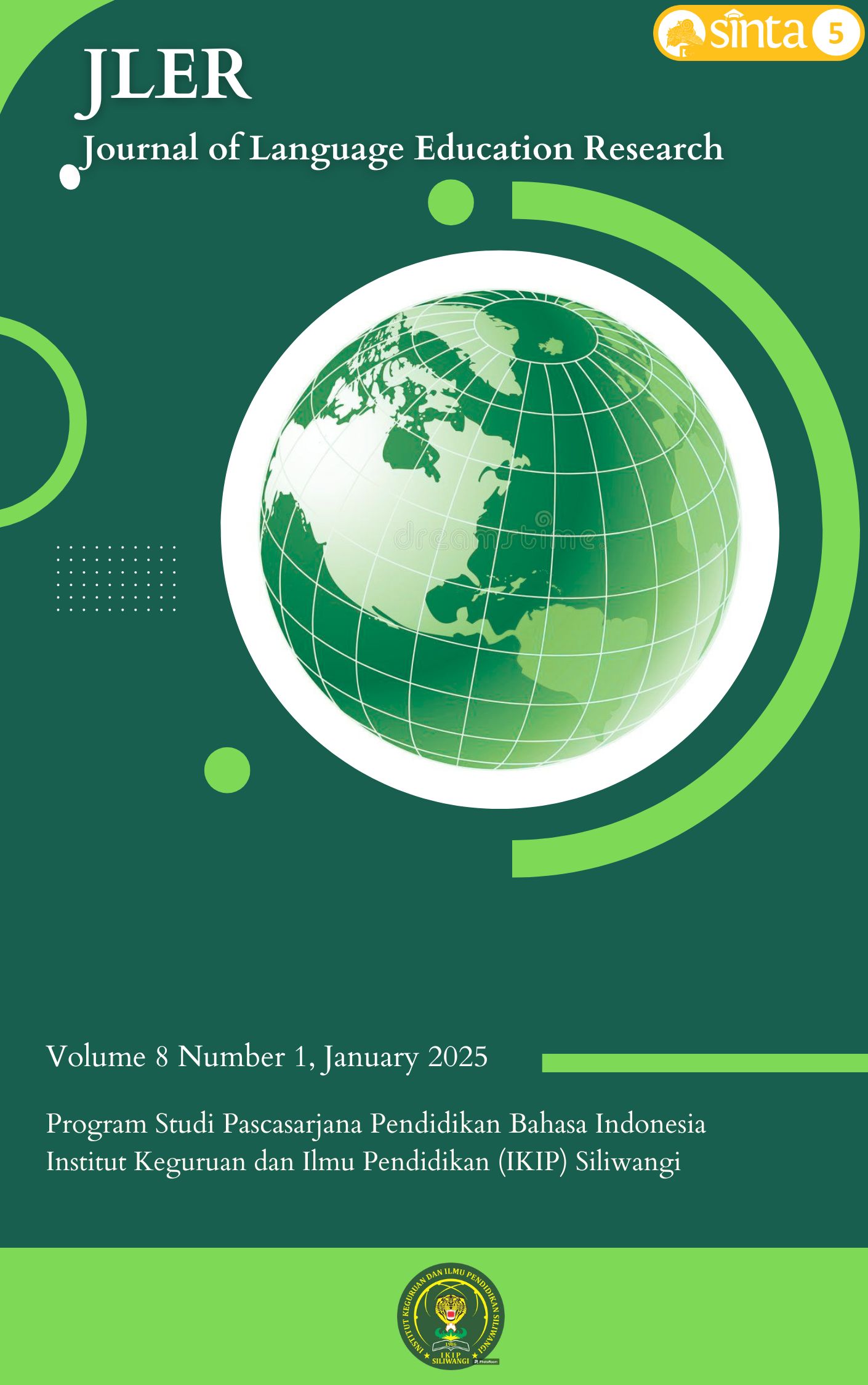A Syntactic Analysis on Efl's Writing Text on Writing Task 2 IELTS
DOI:
https://doi.org/10.22460/jler.v8i1.26194Keywords:
Syntax, English, Writing, Testing SystemAbstract
This study analyzes syntactic structures in EFL students' writing on IELTS Writing Task 2 using qualitative methods. Through in-depth analysis of the texts, the study aims to identify patterns and syntactic errors that frequently appear and how these affect the quality of arguments in the writing. A qualitative research method, which aims to deeply analyze the syntactic structures in EFL (English as a Foreign Language) students' writing on IELTS Writing Task 2. This method was chosen because it allows researchers to explore in detail and depth the elements of language used by writers, especially in terms of sentence structure and grammatical structure. The analysis revealed a general pattern in the use of sentence structure that can affect the coherence and cogency of students' arguments, with some recurring syntactic errors found. Comparison with previous studies revealed that there are certain trends in the development of EFL students' syntactical skills in their writing. This study concludes that a better understanding of syntactic structures is essential for EFL students to improve the quality of their writing in academic contexts. The findings are expected to provide insights for teachers and curriculum developers in designing more effective learning strategies to improve students' writing skills.
References
Akbarnezhad, S., Sadighi, F., & Bagheri, M. S. (2019). Iranian EFL learners’ perception of the English verbs’ argument structure and their language proficiency: A semantic-syntactic approach. Cogent Education, 6(1). https://doi.org/10.1080/2331186X.2019.1674576
Amirjalili, F., & Jabbari, A. A. (2018). The impact of morphological instruction on morphological awareness and reading comprehension of EFL learners. Cogent Education, 5(1), 1–30. https://doi.org/10.1080/2331186X.2018.1523975
Baptista, J., & Mamede, N. (2020). Syntactic Transformations in Rule-Based Parsing of Support Verb Constructions: Examples from European Portuguese. In 9th Symposium on Languages, Applications and Technologies (SLATE 2020). Schloss Dagstuhl-Leibniz-Zentrum für Informatik.
Du Bois, J. W. (2014). Towards a dialogic syntax. Cognitive linguistics, 25(3), 359-410.
Ha, M. J. (2022). Syntactic Complexity in EFL Writing: Within-Genre Topic and Writing Quality. Call-Ej, 23(1), 187–205.
Khan, A. (2022). The effect of writing exercises in classroom on the production of written sentences at undergraduate level by Saudi EFL learners: A case study of error analysis. Cogent Education, 9(1). https://doi.org/10.1080/2331186X.2022.2122259
Marzuki, Widiati, U., Rusdin, D., Darwin, & Indrawati, I. (2023). The impact of AI writing tools on the content and organization of students’ writing: EFL teachers’ perspective. Cogent Education, 10(2). https://doi.org/10.1080/2331186X.2023.2236469
Petchprasert, A. (2021). Utilizing an automated tool analysis to evaluate EFL students’ writing performances. Asian-Pacific Journal of Second and Foreign Language Education, 6(1), 1–16. https://doi.org/10.1186/s40862-020-00107-w
Ruth, E. (2024). EFL teacher beliefs about collaborative writing at Swedish primary school. Education Inquiry, 00(00), 1–19. https://doi.org/10.1080/20004508.2024.2408938
Syahid, W. S. (2023). An Analysis Of Student’s Ability In Writing Procedure Text At The Tenth Grade Of Asy-Syafa’ah Vocational High School Jember (Doctoral Dissertation, State Islamic University).
Thi, N. K., Vo, D. Van, & Nikolov, M. (2023). Investigating syntactic complexity and language-related error patterns in EFL students’ writing: corpus-based and epistemic network analyses. Language Learning in Higher Education, 13(1), 127–151. https://doi.org/10.1515/cercles-2023-2009
Werdiningsih, I., Marzuki, & Rusdin, D. (2024). Balancing AI and authenticity: EFL students’ experiences with ChatGPT in academic writing. Cogent Arts and Humanities, 11(1). https://doi.org/10.1080/23311983.2024.2392388
Yang, Y., Yap, N. T., & Ali, A. M. (2022). A Review of Syntactic Complexity Studies in Context of EFL/ESL Writing. International Journal of Academic Research in Business and Social Sciences, 12(10). https://doi.org/10.6007/ijarbss/v12-i10/14843
Zhang, C., & Kang, S. (2022). A comparative study on lexical and syntactic features of ESL versus EFL learners’ writing. Frontiers in Psychology, 13(November). https://doi.org/10.3389/fpsyg.2022.1002090
Downloads
Published
Issue
Section
License

This work is licensed under a Creative Commons Attribution-ShareAlike 4.0 International License.







